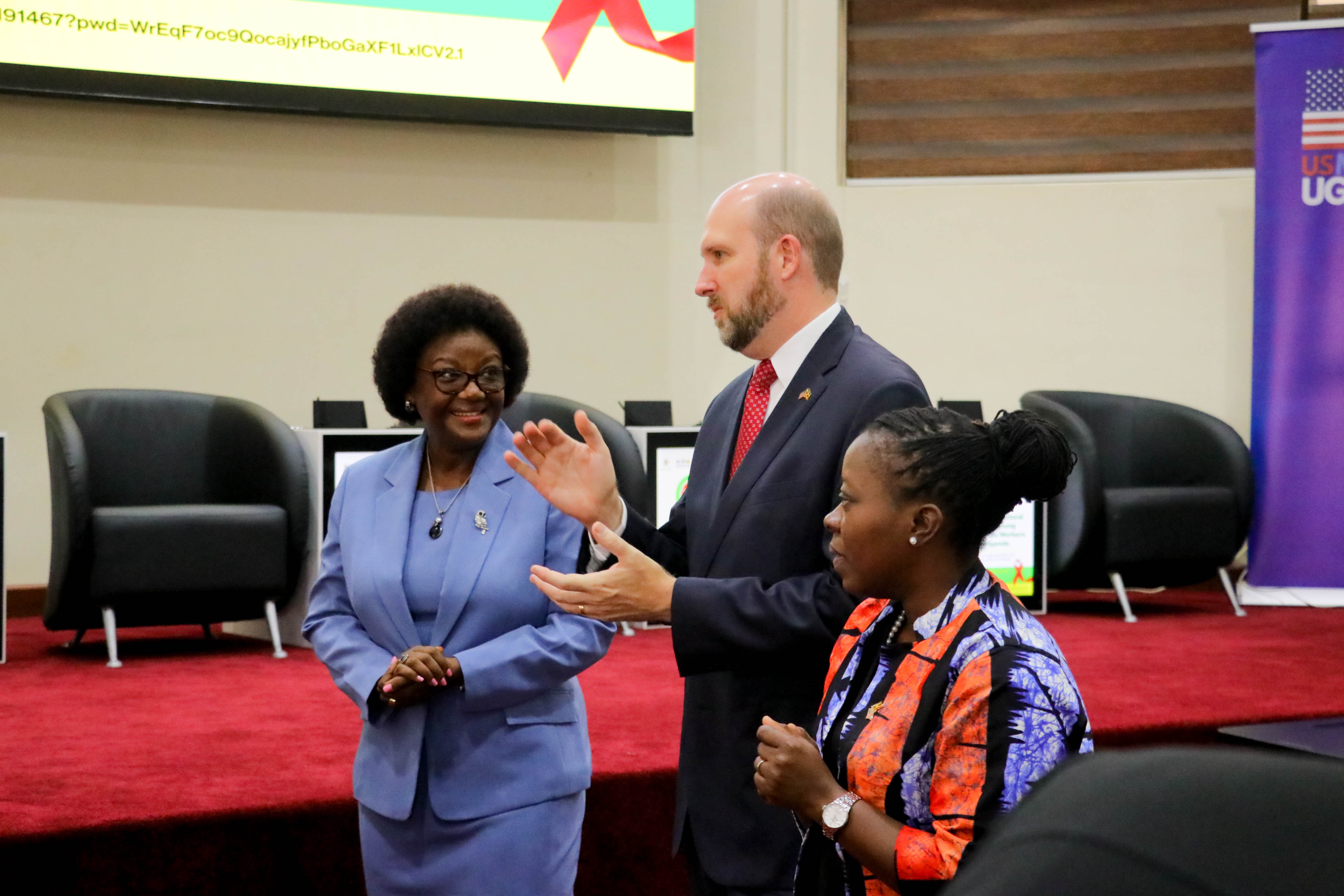
By Okeya John
Under the Crane Survey project, which is a collaborative initiative by Makerere University School of Public Health (MakSPH), Uganda’s Ministry of Health (MoH), and the U.S. Centers for Disease Control and Prevention (U.S. CDC), funded through the U.S. President's Emergency Plan for AIDS Relief (PEPFAR), seeking to generate evidence for informed decision making and health interventions, MakSPH yesterday unveiled a new HIV bio-behavioural survey among female sex workers in Uganda, confirming that this vulnerable population continues to be disproportionately impacted by high HIV prevalence, stigma, and violence.
Conducted yesterday, 16th October 2024, at MakSPH's new auditorium building at Makerere University main campus, the event crowned sub-national dissemination of findings from a national survey covering 12 districts across the regions in Uganda, finalised in 2023, as part of the third phase of the bio-behavioural surveys. The national dissemination event of the new study was officiated by the U.S. Ambassador to Uganda, H.E. William Popp, who emphasised that the information unveiled provides useful insights to strategise on guaranteeing equitable health services and reducing HIV infections and deaths in Uganda.
“I commend Makerere University School of Public Health, under the leadership of Prof. Rhoda Wanyenze, for the dedicated efforts in conducting this collaborative study and to all of you for the work you do to bring Uganda closer to HIV epidemic control. While we celebrate the achievements, we recognise that there is still work to do. The national HIV burden continues to stagnate at an average of around six per cent and an alarming 26-55 per cent among key populations such as female sex workers,” The U.S. Ambassador, H.E. William Popp observed.
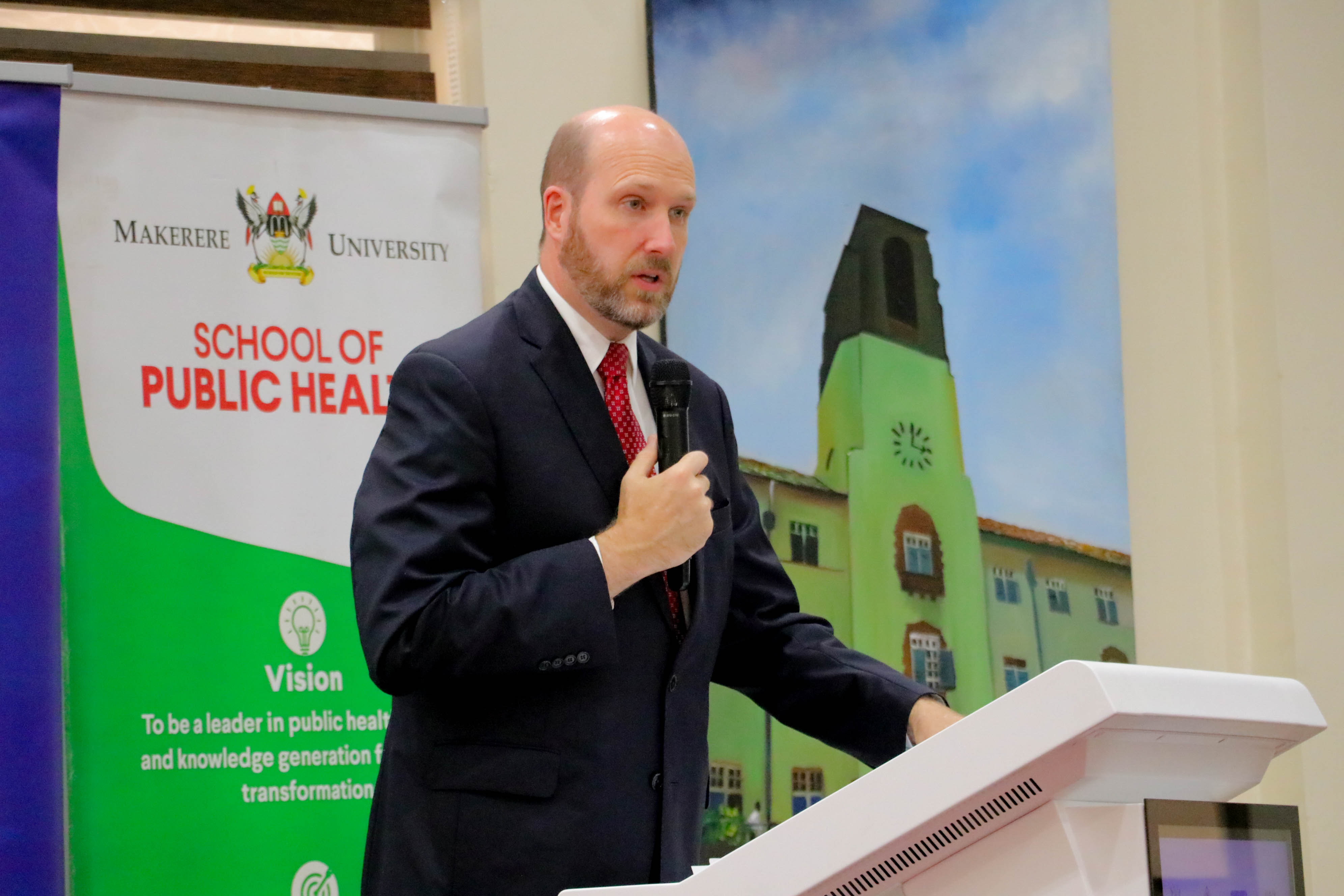
Given the high burden of the disease, especially among the more at-risk populations like female sex workers and sexually exploited minors, the U.S. Ambassador affirmed the U.S. government’s commitment to fostering a healthy population as a key foundation for Uganda’s social and economic transformation, observing that annually, the U.S. invests over $500 million (about UGX 1.87 trillion) in Uganda’s health system, the bulk of which goes to supporting HIV programmes through the U.S. President’s Emergency Plan for AIDS Relief.
So far, since 2008, when the U.S. government first supported Uganda’s Ministry of Health to conduct the first national HIV bio-behavioural surveys with technical support from Makerere University School of Public Health, the American People have committed up to $7,013,396 investment in these surveys, currently in its fourth ongoing phase, aimed at strengthening Uganda’s health systems and national HIV response. During yesterday’s national dissemination of the latest third bio-behavioural study findings, the U.S. Ambassador to Uganda, H.E. William Popp affirmed: “In this spirit, the U.S. government looks forward to continuing to work with you all for a safer, healthier, and HIV-free future.”
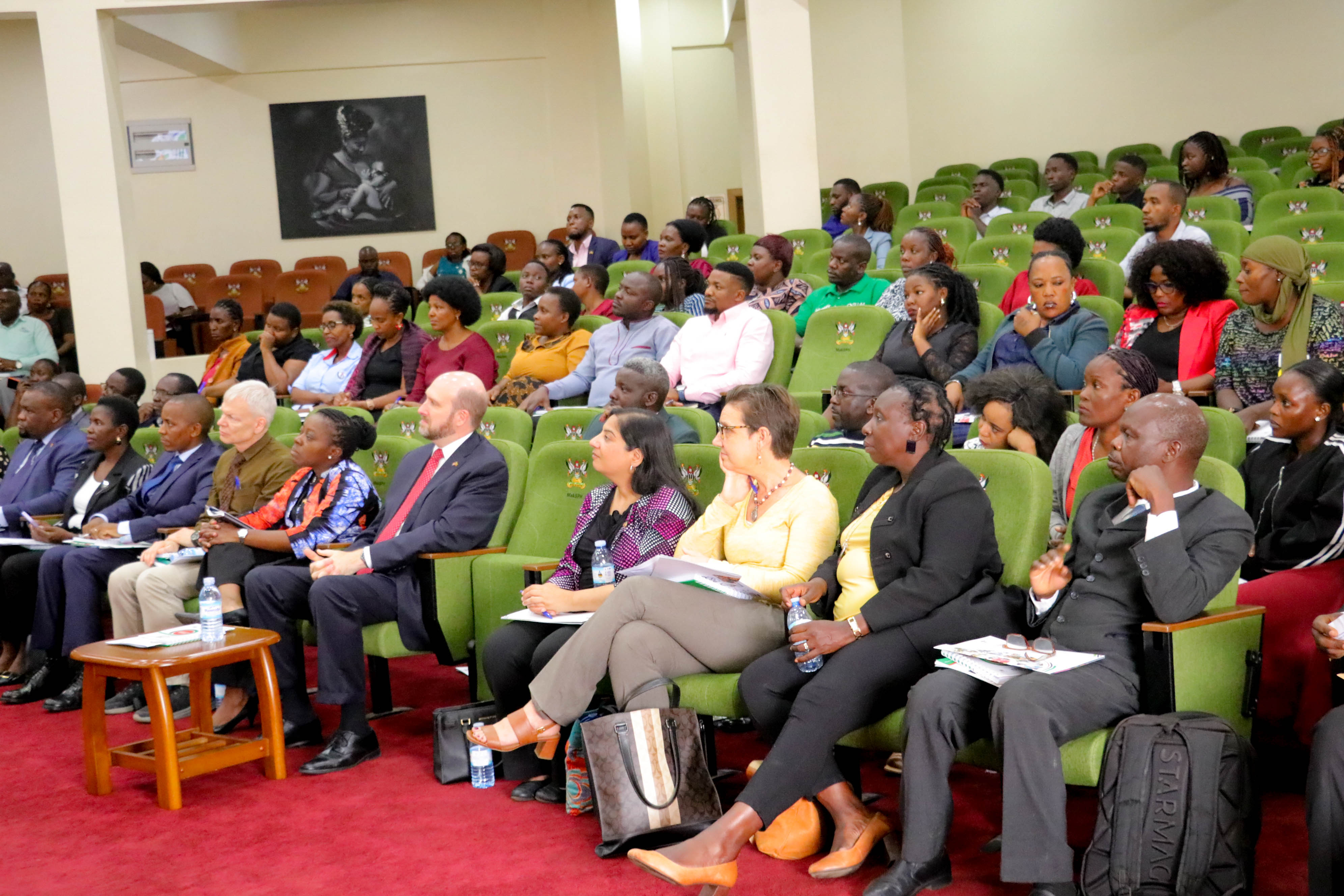
In her opening remarks, Prof. Rhoda Wanyenze, Dean, Makerere University School of Public Health and Principal Investigator of the project noted that the Crane Survey is a trusted source of data for those in HIV eradication efforts, emphasising its importance in informing policies and programme delivery in Uganda, with the survey’s reach now expanding across sub-Saharan Africa. She noted the importance of this initiative in promoting health equity;
“For a long time, this survey has also generated data that informed decisions about Sub-Saharan Africa, because we didn’t have data on key and vulnerable populations. There has just been a review, recently, looking at available data among key populations, and again, this work has been cited among good practices across the African continent. We need to celebrate that and appreciate the U.S. government for enabling us to do this. We also appreciate the U.S. CDC for the very equitable and productive partnership for the work we have done over the years.” Prof. Rhoda Wanyenze noted with gratitude for the continued U.S. support to Uganda.
Adding: “When we talk about inequity; it doesn’t start with service delivery: it starts with people not even being counted; it starts with us not even knowing what happens to them. So, sometimes we say we are doing well and yet we are actually not doing well because we have neglected to collect data on people who are most disadvantaged in our society.”
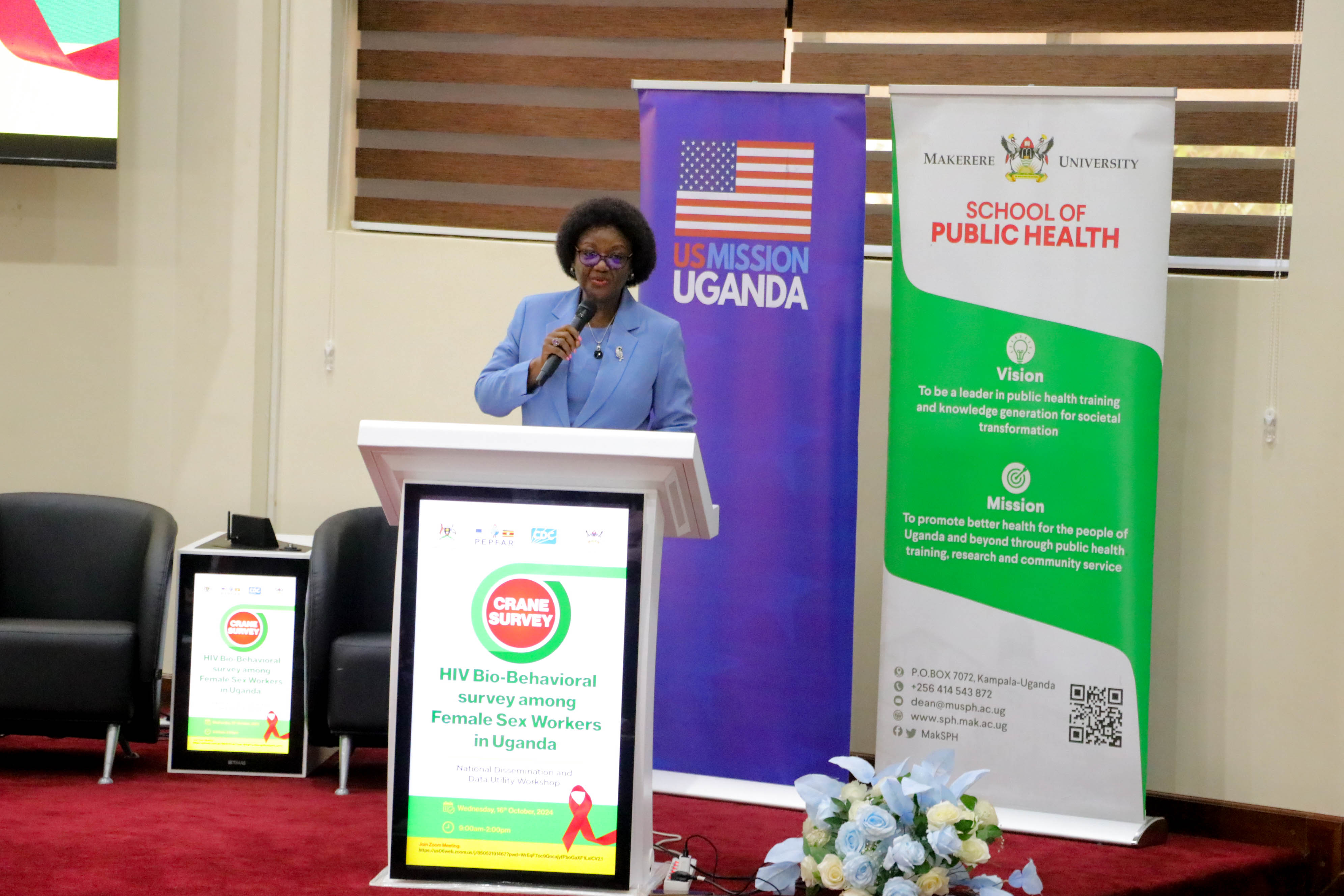
The findings from the latest biological and behavioural survey, presented during yesterday’s national dissemination by Dr. Geofrey Musinguzi, a rectal cancer survivor and Co-Principal Investigator for the Crane Survey project at Makerere University School of Public Health, confirm that female sex workers and sexually exploited minors in Uganda are disproportionately affected by the HIV disease burden, with up to 55 per cent HIV prevalence rates in some areas, a figure that is way beyond Uganda’s national HIV prevalence that stands at 5.8 per cent.
The third round of the HIV biological and behavioural surveys was conducted in the districts of Arua, Busia, Buvuma, Fort Portal, Gulu, Jinja, Kampala, Lira, Masaka, Mbale, Mbarara, and Tororo, where a total of 7,947 female sex workers aged 18 to 49, as well as, sexually exploited minors aged 15 to 17, were interviewed using audio computer-assisted self-interviews technology. The participants' behavioural and biomarker characteristics were then measured, including HIV prevalence rates, syphilis, and human papillomavirus (HPV) infections.
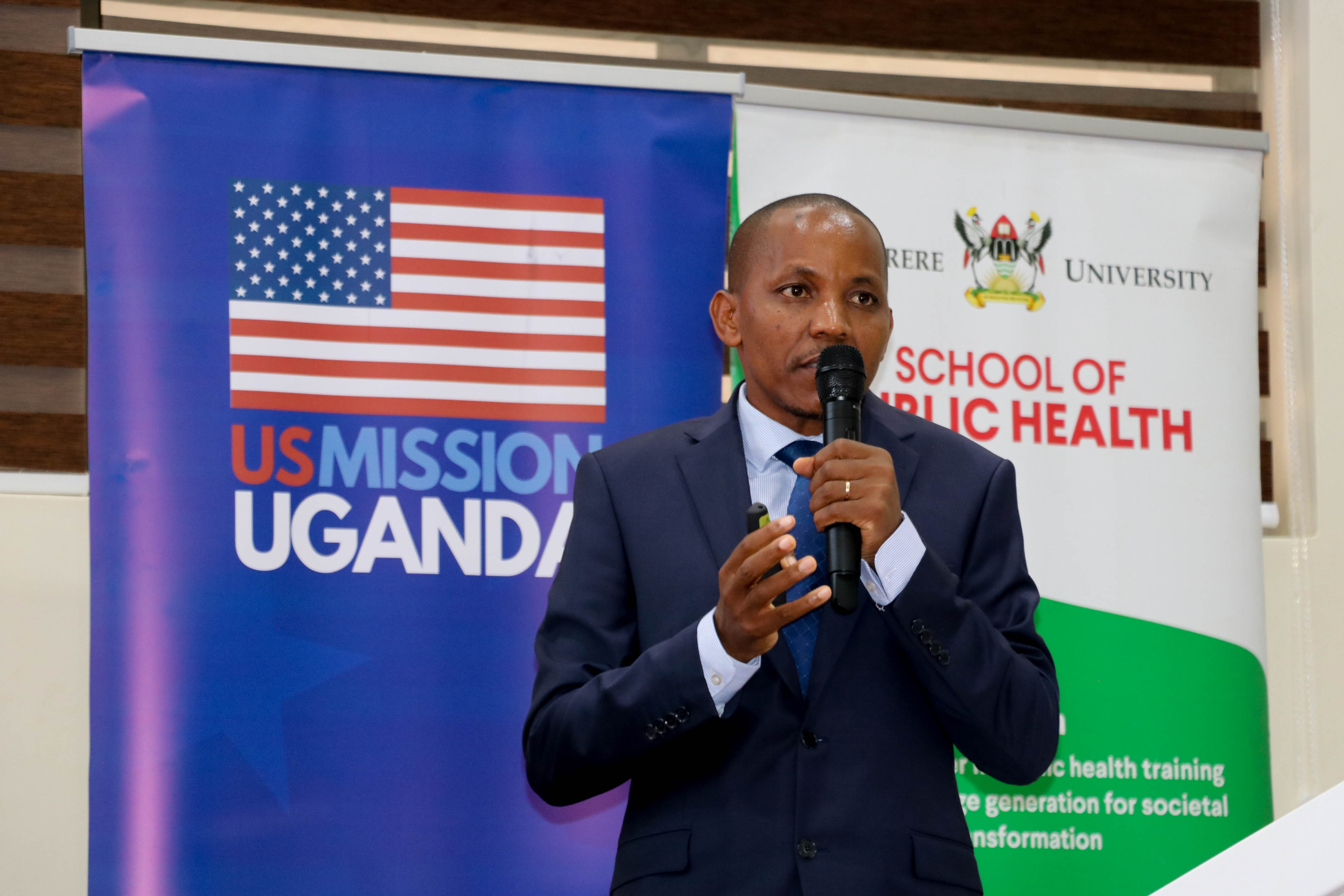
The survey findings show that one in every three female sex workers and sexually exploited children are living with HIV in Uganda, with prevalence highest among those aged 35 to 49, at a staggering 54 per cent. Although, on a positive note, 90 per cent of this group were found to be aware of their status, and 80 per cent enrolled on treatment. About five per cent of the participants tested positive for active syphilis, while another one-third tested positive for high-risk Human Papiloma Virus (HPV) infections, which significantly increases their risks to cervical cancer.
The survey also confirmed high cases of violence and exploitation against these vulnerable populations, with 42 per cent reportingly experiencing rape and another half physical assault within the past year. Still, another key thing to note is that 81 per cent of the participants faced stigma while seeking services in healthcare facilities, hindering their access to critical and life-saving services, while most did not want to be identified by the healthcare providers as sex workers. Additionally, four in five female sex workers suffered from depression.
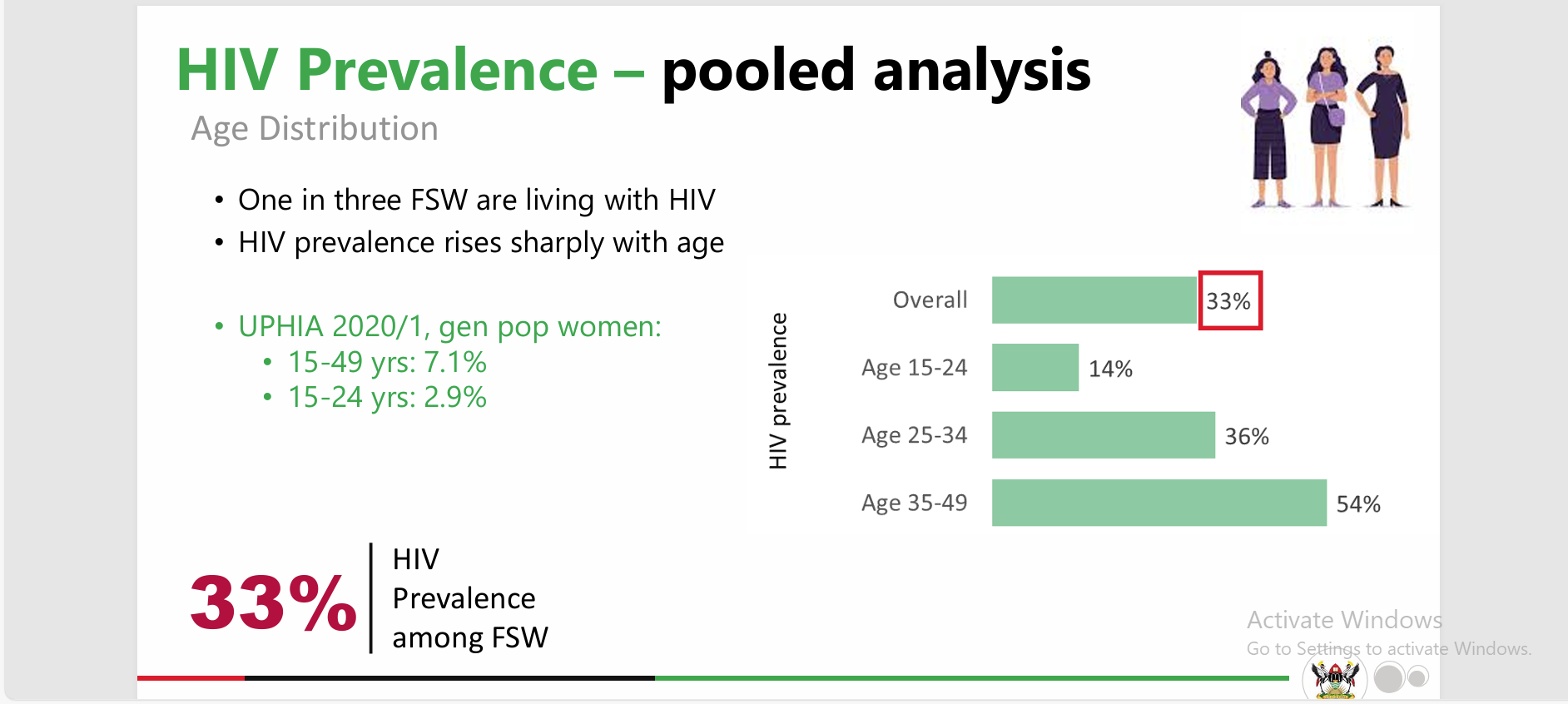
Accordingly, among other interventions, the survey report highlights the urgent need for mental health support alongside HIV prevention services in our national HIV programming. It calls for targeted interventions to support key populations, specifically female sex workers and sexually exploited children, including applying strategies that include integration of HIV programmes with interventions that address other social and safety needs like economic empowerment, maternal care, mental health concerns, alcohol and drug abuse, violence, stigma, discrimination and access to justice as important inroads towards alleviating the disease burden on key populations in Uganda.
For Dr. Henry Mwebesa, the Ministry of Health’s Director General, Health Services, represented by the Head of the Aids Control Programme in the ministry, Mr. Robert Mutumba, the survey represents a critical leap in the country’s ongoing efforts to achieve epidemic control leveraging on research, surveillance, and data-driven interventions, targeted at key and vulnerable populations that are driving the HIV epidemic.
“The Makerere University School of Public Health Crane Survey has been instrumental in supporting the Ministry of Health’s efforts to enhance HIV prevention, care, and treatment; focusing on key and priority populations through surveillance and surveys among these targeted groups, addressing stigma and discrimination through innovative technologies like the audio computer-assisted self-interviews and strengthening data-informed programming through the use of real-time data from sentinel surveillance to inform decision-making that ensures resources are directed where they are needed the most.” Dr. Mwebesa noted.

On the other hand, giving the closing remarks, Dr. Nelson Musoba, the Director General of the Uganda AIDS Commission, represented by Dr. Daniel Byamukama, the Commission’s Head of HIV Prevention, highlighted the critical role Crane Survey has played in Uganda's national HIV response, particularly in generating essential data for reporting, planning, and advocacy. He emphasised that without the Crane survey, the country's understanding of key populations such as female sex workers would be significantly limited, noting that this data has been instrumental in addressing stigma, violence, and legal barriers faced by this vulnerable population.
He assured that the findings of the new HIV bio-behavioural survey shall guide Uganda's national strategy, refine the HIV/AIDS policy, and guide targeted service delivery, including HIV testing and pre-exposure prophylaxis (PrEP). He also stressed the need for continued advocacy and collaboration with stakeholders, including the U.S. government, to ensure adequate resources and to challenge stigma and discrimination, affirming that the Uganda AIDS Commission remains committed to leveraging this data to mobilise resources and align efforts to end HIV/AIDS as a public health threat in Uganda by 2030.
Makerere University School of Public Health continues to play a critical role in generating knowledge and research evidence that informs national health policies and programmes in Uganda and the world. The dissemination of the third Crane Survey finding on key populations, therefore, serves as an important step towards improving Uganda’s national HIV response, with stakeholders calling for urgent action to close the gaps highlighted by the study’s results.
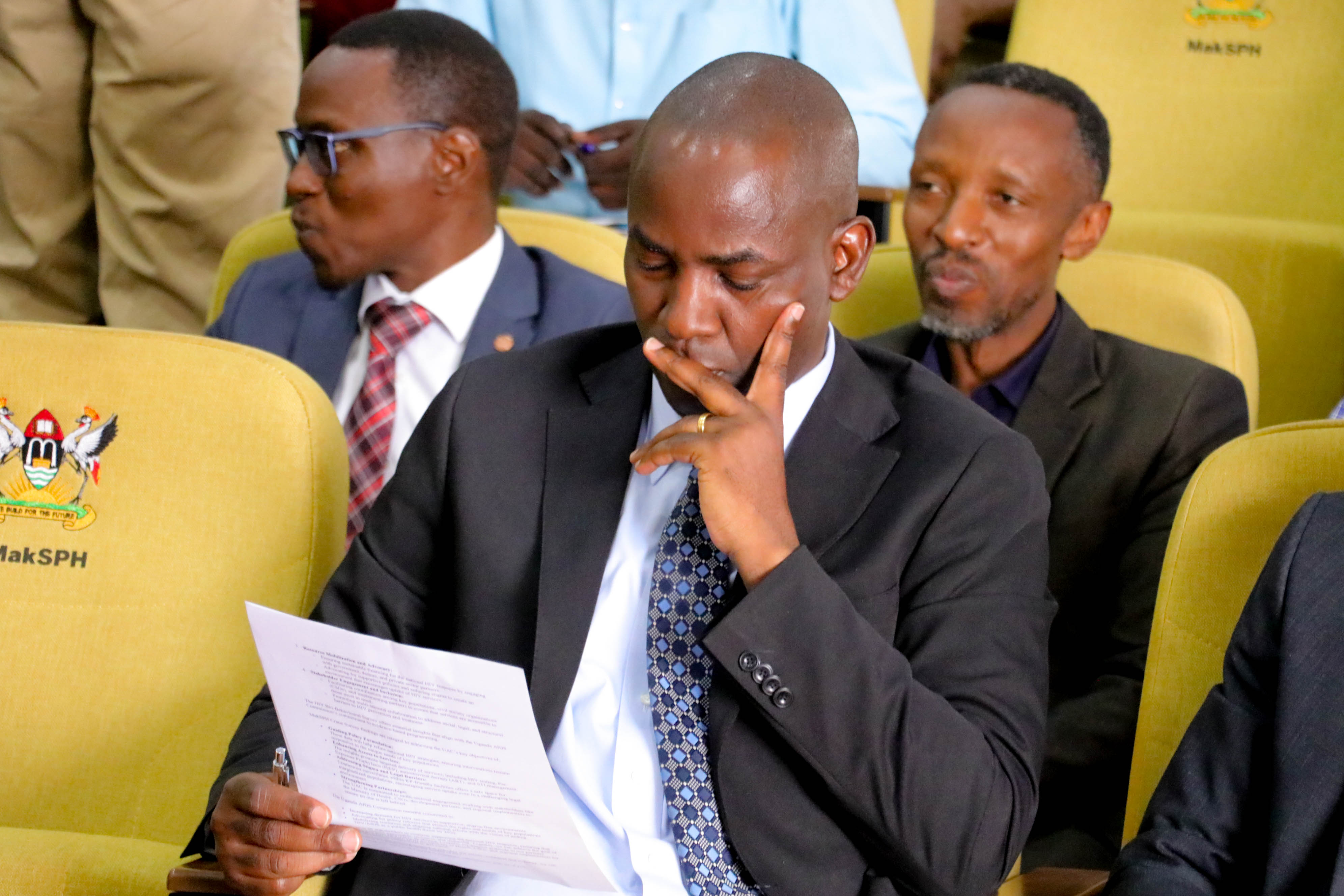
| Attachment | Size |
|---|---|
| national_dissemination_presentation (3.05 MB) | 3.05 MB |

